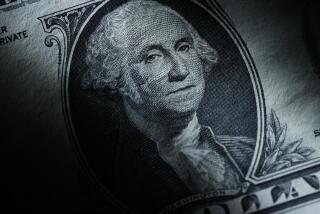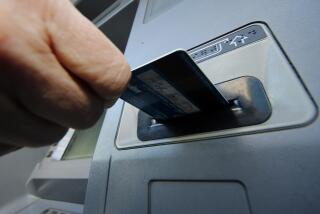Savers Not Always Aware of How Banks Lend Money
- Share via
LONDON — Many people would prefer not to lend their money to arms dealers, tobacco companies or cosmetic firms that test on animals.
Yet that’s just what they could be doing by depositing their savings in a bank that doesn’t discriminate in the companies it deals with.
“When you put 1,000 pounds [$1,642] into the bank, they don’t just put it into the safe until you want it again,” said Dave Smith, a spokesman for the U.K.’s Co-Operative Bank Plc. “Your money could be going to support something you’re opposed to.”
Take oil company Shell Transport & Trading Plc. Thousands of consumers boycotted about two years ago over its intention to dump an obsolete oil storage tank into the North Sea. The company has also been criticized over alleged involvement in human rights abuses in Nigeria, which the company denies.
Yet how many of those critics were inadvertently lending their own money to Shell? According to research by the Ethical Consumer Research Assn., Shell is a corporate customer of Barclays Bank Plc, Lloyd’s-TSB Group Plc, and HSBC Holdings Plc, parent company of Midland Bank.
A study last year by the consumer association examined the ethical credentials of U.K. banks and buildings societies, mortgage lenders owned by their customers.
National Westminster was rated highly for its exemplary internal environmental controls, as well as very low levels of loans to developing countries--which some people consider to be a cause of poverty and environmental degradation in the Third World.
However, NatWest, like the other major banks, says it’s not the responsibility of a lender to “police” its customers’ business, according to the company’s ethics statement. It doesn’t include ethical considerations in its lending criteria.
The Co-Op Bank, with assets of about 4 billion pounds and about 2 million individual account holders, is the only one of the U.K. clearing banks to place an ethical policy at the center of its operations. The bank won’t invest in or supply financial services to oppressive regimes, arms manufacturers, major polluters, tobacco firms, cosmetic companies that test on animals, fur producers, factory farms or blood sports organizations.
Since the policy was officially published in 1992, “one-third of all new customers claim the main reason why they joined is the ethical stance,” Smith said.
The 4.75% rate the Co-Op pays on its account for regular savings of at least 100 pounds a month isn’t bad, said Vicki Burn, deputy editor at MoneyFacts Group, which collates details of interest rates.
Small savers who don’t want to be too vigilant about where their money’s going, and still get good interest rates, could opt for one of the U.K.’s remaining building societies. These are limited to lending 25% of their assets on business other than fully secured residential mortgages, although in practice many will continue to limit their activities to mortgage business.
In the United States, the number of “socially responsible” institutions is growing, said Elizabeth McGeveran, a spokeswoman for Co-Op America. Many are community banks, set up specifically to finance local regeneration projects or provide finance not available from ordinary banks, while providing the full range of services at market rates. They include South Shore Bank in Chicago, Albina Bank in Oregon and the Socially Responsible Banking Fund of the Vermont National Bank.
More to Read
Inside the business of entertainment
The Wide Shot brings you news, analysis and insights on everything from streaming wars to production — and what it all means for the future.
You may occasionally receive promotional content from the Los Angeles Times.










